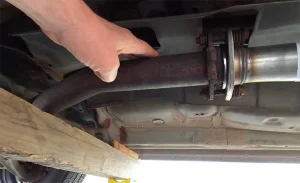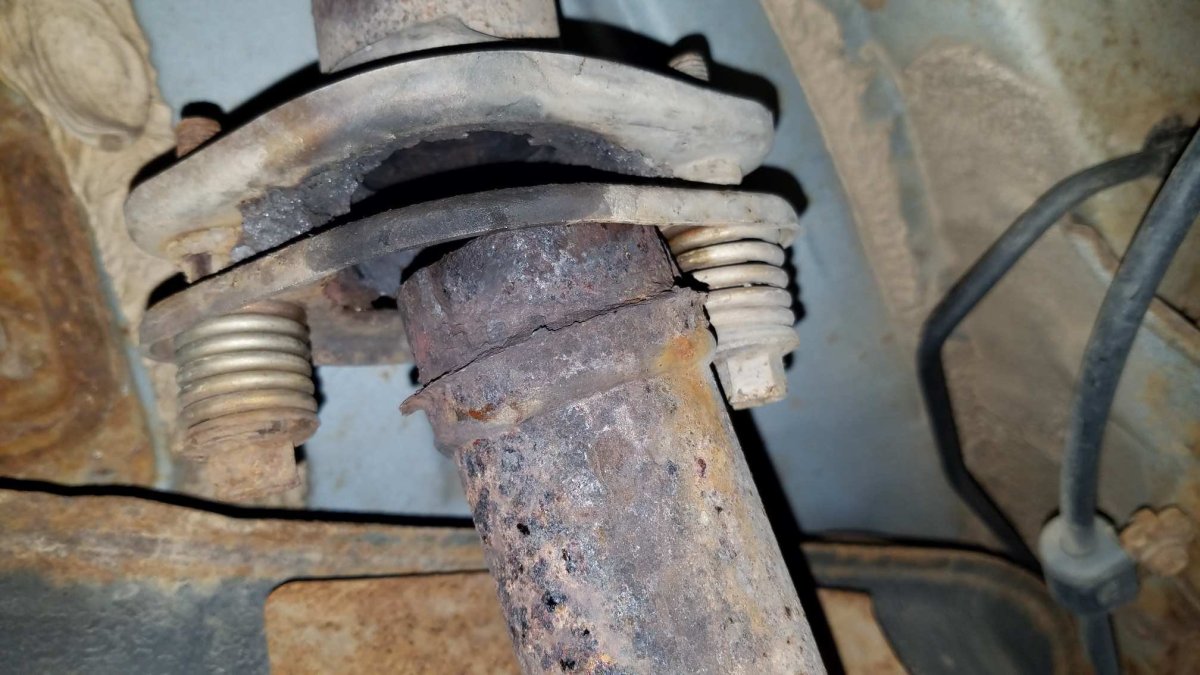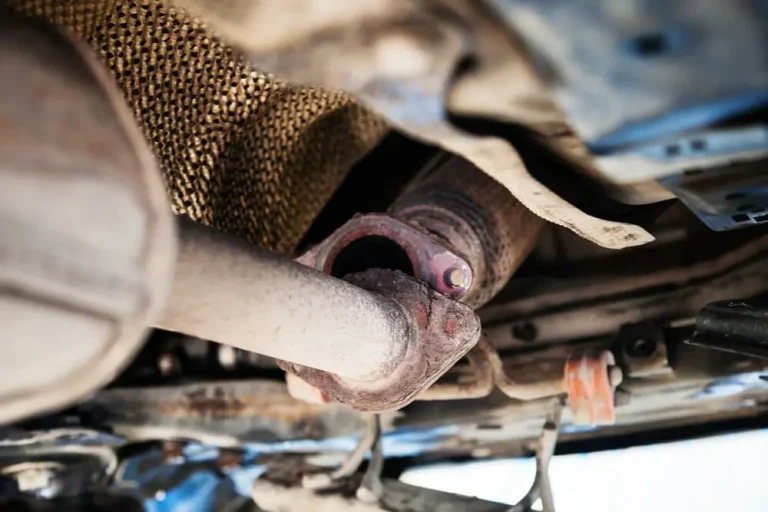Imagine yourself relaxing while driving down the road in your dependable vehicle when all of a sudden, you hear a grating hissing or rumbling sound coming from beneath. It’s not your favourite tune playing on the radio; rather, your car’s flange has an exhaust leak. Now, if you’re not an expert on cars, don’t worry; correcting this problem may be simpler than you think. Numerous car owners frequently deal with an exhaust leak on a flange.
It occurs when there is a hole or gap at the junction of the exhaust components, frequently close to the flange gasket. This gap not only makes your automobile sound like it’s growling, but it also creates dangerous fumes that could endanger your safety. Therefore, by using our easy-to-follow instructions, we’ll break down the procedures in this article to help you if you’re wondering how to fix an exhaust leak on flange of a car. Prepare to experience a smoother, safer, and quieter ride very soon!
Table of Contents
What Is An Exhaust Leak On A Flange In A Car?
Before learning about how to fix an exhaust leak on flange. Firstly, we’ll examine what is an exhaust leak on a flange. A car’s exhaust leak on the flange acts as a covert escape route for the exhaust gases. Additionally, we refer to it as the car’s breath. You see when fuel is burned in a car’s engine, these gases are produced. Moreover, they must leave the vehicle through the exhaust system for the engine to function properly and to stop dangerous pollutants from entering.

The flange functions as a key intersection in this exhaust system. It is where many exhaust parts assemble and are intended to tightly seal. But occasionally, mishaps happen. When there is a hole or gap near this junction, there will be an exhaust leak on the flange. These gases escape through the leak as opposed to the correct pipes and mufflers.
This might cause your car to sound loud and rough, but the issue goes beyond loudness. Safety is a concern as well because these gases may be damaging to the environment and you. Therefore, to keep your automobile operating smoothly and guarantee everyone’s safety, correcting an exhaust leak on a flange is crucial.
Explain The Common Causes Of An Exhaust Leak On A Flange Of A Car
Think of the exhaust system in your car as a network of pipes and components that safely direct the byproduct gases from your engine out into the environment. It functions as a kind of automobile chimney. Now, when this system functions properly, everything is good, but on occasion, it may experience a leak, particularly near a component known as the flange.
1. Corrosion:
Corrosion is a typical cause of an exhaust leak on a flange. This occurs as a result of the metal pipes and flanges in your exhaust system rusting over time. Rust eats away at the metal like a cunning burglar, leaving tiny gaps or holes in the flange. These openings allow exhaust gases to escape prematurely, creating noise and potential danger.

2. Vibrations:
Isn’t it sometimes like riding in a bumpy car? Everything under your car, including the nuts and clamps holding the flange in place, can be shaken apart by all those bumps and vibrations. An exhaust leak may result if these nuts and clamps become loose as a result of the vibration.
3. Faulty Gaskets:
Put the gasket between the flange and other exhaust components as a form of cushion or seal. Like an old rubber band losing its pliability, this gasket may eventually wear out. As it ages, it loses its ability to effectively seal the connection between the flange and the remainder of the exhaust system, allowing gases to escape.

4. Impact Damage:
Your car may occasionally run into obstructions like speed bumps, trash on the road, or even rocks. The exhaust system, including the flange, may sustain damage from these hits. It’s similar to having a bruise on the belly of your car, which can result in a leak.
So those are the four main causes; corrosion, vibrations, worn gaskets, and impact damage for why your car could experience an exhaust leak on the flange. These problems can increase your car’s noise level and potentially endanger your health by releasing dangerous substances into the air you breathe. Don’t worry, though; we’ll show you how to fix an exhaust leak on flange so that your automobile continues to run smoothly and silently.
How To Fix An Exhaust Leak On Flange?
You may have an exhaust leak if you hear an odd hissing or popping sound coming from your car’s exhaust, especially at the flange. Don’t worry; repairing it only requires a few easy actions. Here is a brief explanation in simple words:
1. Safety First:
Make sure your automobile is securely parked on a level area, that the engine is off, and that it is cool to the touch before you begin. To protect yourself, put on gloves and safety eyewear.
2. Locate The Leak:
When your automobile is running, pay close attention to the area near the exhaust system for any odd noises. Use a flashlight to scan the flange region for any obvious gaps, holes, or missing pieces.

3. Tighten The Bolts And The Clamps:
Utilize a wrench to tighten any exposed loose clamps or bolts. Therefore, do not overtighten in order to prevent damage.
4. Replacement Of The Gasket
Remove the gasket (a type of seal) gently and swap it out with a new one if it is outdated or damaged. Make sure the replacement gasket matches the exhaust system on your car.

5. Utilize Sealant:
To fill in any gaps or holes at the flange, apply some exhaust sealant or putty. For the proper procedure, adhere to the directions on the sealant packaging.
6. Leak Detection Test:
As directed on the product package, give the sealant some time to dry. After that, restart your vehicle and look for any additional leaks. If not, you may proceed.

Therefore, these problems must be resolved since, if ignored, they may result in noisy and damaging consequences. Additionally, if you handle the repairs yourself, you’ll save money. Remember, it’s always a good idea to see a professional mechanic if you’re not confident handling this on your own or if the leak is significant.
Frequently Asked Questions:
Now that we’ve covered how to fix an exhaust leak on flange of your car. Therefore, now. let’s see some frequently asked questions to gain more insights into the topic.

How Can I Tell If The Exhaust Flange On My Automobile Has A Leak?
For the health of your car, finding an exhaust leak is essential. Search for odd noises, and hissing sounds close to the exhaust, and physically check the flange area for damage or gaps.
Can I Still Drive With An Exhaust Car Leak?
It is normally unsafe to drive while there is a tiny leak, yet it is doable momentarily. Leaks in the exhaust system can impair engine efficiency and let dangerous pollutants into your automobile.

Is It Okay To Repair Exhaust Leaks With Diy Sealants?
DIY sealants may offer a quick repair, but they might not be a long-term fix. If you’re unsure whether sealants will work for your particular problem, ask your mechanic for guidance.
When Is The Right Time To Consult A Specialist About An Exhaust Leak?
It is preferable to seek the advice of a qualified mechanic if you are unsure about how to fix the leak yourself or if it is a serious problem. They are qualified to identify and fix exhaust issues.
Are Flange Exhaust Leaks Frequent?
Yes, because of things like corrosion, vibrations, and gasket wear, exhaust leaks on flanges occur frequently. Regular maintenance can aid in early detection and prevention of these problems.
Conclusion:
Simply put, a quieter, safer ride depends on repairing an exhaust leak on the car’s flange. Therefore, if you were wondering how to fix an exhaust leak on flange of your car. Then, you may quickly fix this common problem by tightening loose nuts, replacing worn gaskets, and using a sealant. Regular upkeep and prompt repairs guarantee that your car’s exhaust system runs effectively, preventing dangerous emissions and obtrusive noise in addition to helping you save money. So, to keep your car running at its best, deal with flange leaks right away.
